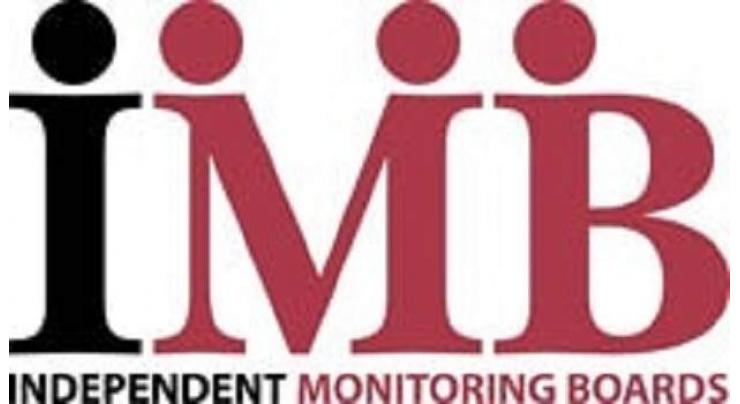
Pakistan's Commitment To End Poliovirus Transmission Acclaimed
Faizan Hashmi Published December 08, 2017 | 02:30 PM

The Independent Monitoring Board (IMB) of the Global Polio Eradication Initiative (GPEI) has acknowledged the strong visible national and provincial leadership of the polio eradication programme in Pakistan
ISLAMABAD,(UrduPoint / Pakistan Point News - 08th Dec, 2017 ) :The Independent Monitoring board (IMB) of the Global Polio Eradication Initiative (GPEI) has acknowledged the strong visible national and provincial leadership of the polio eradication programme in Pakistan.
Commending the dedication and hard work of leaders and staff of the polio programme, the 15th IMB report titled �Every Hiding Place� noted that Pakistan�s Prime Minister is taking an encouragingly hands-on approach as he chairs regular National Task Force meetings, as well as conducting fortnightly meetings with leaders at the provincial level.� Strong political support has been necessary to urgently strengthen workforce capacity; for example, limited effectiveness of health workers in Islamabad was identified as a problem and a decision to appoint more effective staff has been taken.
It is an example where identifying a root cause of weak performance and taking decisive action to address it can be pivotal in achieving a breakthrough, the report mentioned. The report follows a meeting in late October and early November 2017 in London with GPEI staff, donors, extended partners, together with health ministers and officials from Pakistan, Afghanistan and Nigeria.
The IMB provides an independent assessment of the progress being made by the GPEI in the detection and interruption of polio transmission globally. Taking an overview of the epidemiological situation in Pakistan, transmission of poliovirus has been interrupted at every site but never at the same time.
In spite of a very low number of paralytic cases, the poliovirus is still being found in many parts of the country in the environment, the report noted. The main concern lies at the ongoing circulations of poliovirus in Quetta Block, Karachi and wider Sindh as well as the twin cities of Islamabad and Rawalpindi where the virus has found a new home outside the core polio reservoirs.
Continuing to endorse the approach of the GPEI to regard Pakistan and Afghanistan as one epidemiological block with poliovirus corridors that span the two countries, the IMB emphasized on continuing action by the governments of the two countries to work cooperatively to secure strong cross-border arrangements for polio vaccination.
The report noted that the current programme performance is yet to reach the level necessary to clear wild poliovirus out of either of these two endemic countries, calling for a transformative solution for an inaccessible large, high-risk mobile population, potentially moving poliovirus across and between the two countries.
The quality of microplanning and microcensuses is vital when there is such large-scale population movement, the IMB underlined. While the polio programme in both Pakistan and Afghanistan is focusing on the very high-risk districts within their countries, the high-risk mobile populations that enter and leave key reservoir areas and the major population flows across the borders, and a great deal of work has been undertaken to describe the composition of the high-risk populations and in mapping their movements, detailed assessment, profiling and small area analysis is allowing segmentation of districts is recommended so that intensive effort can be directed towards the most polio-vulnerable geographies.
The IMB was convened in November 2010 at the request of the World Health Assembly to monitor and guide the progress of the Global Polio Eradication Initiative's 2010-2012 Strategic Plan. The IMB releases quarterly reports to provide an honest and transparent
Related Topics
Recent Stories

Aiman Khan granted UAE Golden Visa

PSX achieves significant milestone, surpasses 72,000 mark

Pak Vs NZ T20I: Orphaned children extended special invitation to watch match

Finance Minister lauds UNDP’s unwavering support during floods

President Raisi leaves for Iran from Karachi

Currency Rate In Pakistan - Dollar, Euro, Pound, Riyal Rates On 24 April 2024

Today Gold Rate in Pakistan 24 April 2024

Punjab CM inaugurates Pakistan’s first Virtual Women Police Station

Dutch model Donny Roelvink embraces Islam

Experts raise concerns over introduction of 10-stick packs

Iranian president arrives in Karachi

Law Minister expresses Govt's resolve to address issue of missing persons
More Stories From Health
-

Rawalpindi woman gives birth to six babies
5 days ago -

DC calls for intensive anti-polio drive in ICT
6 days ago -

World Hemophilia Day observed to underscore importance of providing comprehensive care
7 days ago -

Six in a family with heart on the 'right side'
7 days ago -

Diabetic disease increasing rapidly : Dr. Noor Elahi Memon
7 days ago -

World Hemophilia Day observed
7 days ago
-

ATC dismisses bail petition of doctor involved in illegal kidneys transplant
15 days ago -

Dr. Shehzad warns against deviation from WHO guidelines on anti-smoking
15 days ago -

Health activists express concerns over attempts to derail tobacco control
17 days ago -

UHS declares MBBS first prof, MS urology exam results
26 days ago -

Increased diagnostic testing for drug resistance
1 month ago -

IRD releases groundbreaking results of end TB programme
1 month ago











